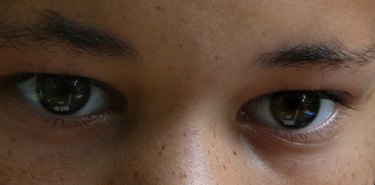
Diabetes causes higher-than-normal blood sugar levels, which can damage small blood vessels in the eye. Many people with diabetes suffer vision complications that develop slowly over the course of their disease. High blood sugar levels can also cause temporary vision changes related to high blood glucose levels after a meal.
Causes
Video of the Day
When a person with diabetes eats a meal, blood glucose levels rise. If the meal is high in carbohydrates, blood sugar might rise to much higher-than-normal levels and take longer than usual to return to normal levels. When blood sugar levels rise, glucose accumulates in the lens of the eye. To dilute the high levels of glucose, the lens also absorbs more fluid. The extra fluid changes the shape of the lens, which can affect the ability to see, the Harvard Medical School Family Health Guide explains. The lens in the eye normally changes shape for near or distance vision. Swelling in the lens changes its shape, causing blurred vision.
Video of the Day
Prevention
Preventing large changes in the amount of glucose in the blood by controlling carb intake during meals helps prevent lens swelling and vision changes after meals. While everyone experiences a rise in blood sugar after eating, choosing foods that cause blood sugar levels to rise more slowly can help stabilize blood sugar levels and avoid the increased levels that can affect the lens of the eye.
Food Choices
Carbs with a low-glycemic index cause a slower rise in blood sugar levels and are less likely to cause the spikes in blood sugar that can lead to lens changes. The glycemic index assigns foods a value based on a scale of 1 to 100, with pure glucose given a rating of 100. All other foods are compared with glucose, the most quickly-absorbed carb. A food with a score of 60, for example, causes a rise in blood sugar 60 percent as much as glucose, Iowa State University explains.
Prescription Changes
Because blood glucose levels might fluctuate more than normal when diabetes is first diagnosed, your doctor might suggest not changing your glasses prescription until your blood sugar levels stabilize, explains Dr. Charles Slonim of All About Vision, because your vision might improve when your blood sugar levels are under control.
- NetWellness: Eye Health and Diabetes
- "Harvard Medical School Family Health Guide"; Anthony Komaroff; December 2004
- All About Vision: Diabetes and Diabetic Retinopathy Q&A
- Iowa State University; "Using the Glycemic Index to Compare Carbohydrates"; Karin Westberg et al
- American Diabetes Association: Carbohydrate Counting
Is this an emergency? If you are experiencing serious medical symptoms, please see the National Library of Medicine’s list of signs you need emergency medical attention or call 911.